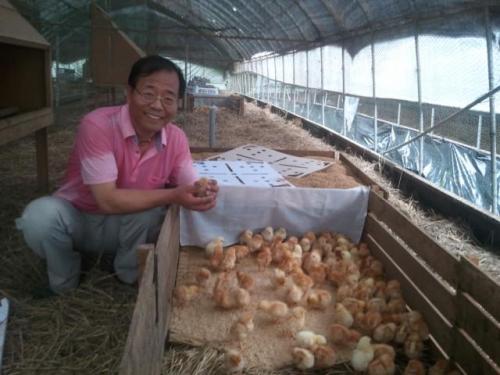Getting hold of organic local produce might seem no easy task as an expatriate when even a trip to the supermarket can cause some head-scratching. But a recently established food co-op catering to foreigners is set to make it all the easier.
Less than a fortnight old, Paldang Slow Food, Local Food Cooperative is the result of a partnership between Seoul Global Study Group, a community project which sponsors discussions and seminars on issues important to Korea and the world, and Paldang Organic Village in Namyangju city, Gyeonggi Province.
“I wanted to give other people the opportunity to buy local, organic food,” said Daniel Rhodes, who along with Sungkyunkwan University professor Layne Hartsell came up with the idea for a co-op that would cater to foreigners.
“So as a result Layne Hartsell and I, we both are coordinators for Seoul Study Group, got into contact with Kim Byeong-su from the Paldang Village. Our job is to organize the foreign community and just make them aware they can purchase this organic food.”
Less than a fortnight old, Paldang Slow Food, Local Food Cooperative is the result of a partnership between Seoul Global Study Group, a community project which sponsors discussions and seminars on issues important to Korea and the world, and Paldang Organic Village in Namyangju city, Gyeonggi Province.
“I wanted to give other people the opportunity to buy local, organic food,” said Daniel Rhodes, who along with Sungkyunkwan University professor Layne Hartsell came up with the idea for a co-op that would cater to foreigners.
“So as a result Layne Hartsell and I, we both are coordinators for Seoul Study Group, got into contact with Kim Byeong-su from the Paldang Village. Our job is to organize the foreign community and just make them aware they can purchase this organic food.”

Vanessa Falco, one of co-op’s first members, said the co-op is the first of its kind.
“There is a co-op called Hansalim but it’s all in Korean and so there’s pretty much no foreigners in it unless they can read Korea or want to go through the trouble of having a friend go to the website and buy the food and sign up,” she said. “(Our co-op)’s open to anyone, Koreans and foreigners, but it’s been targeted for the foreign community as a way to get local and organic produce and it’s in English so it’ll be easy, obviously.”
On account of it being winter, the co-op currently stocks eggs, cookies and several kinds of bread and jam. From spring, members will be able to purchase fruit and vegetables including apples, pears, persimmons, kiwis, white cabbage, broccoli, spinach, carrots and green and red peppers. Membership costs 60,000 won, and purchases can be picked up at WWOOF office in Anguk in Seoul. Members who purchase over 50,000 won worth of produce can have it delivered to their door.
Falco admits that local, organic produce costs more, but for her, supporting local farmers makes it more than worth it.
“I think people who feel strongly about environmental issues or about supporting their local community would do it,” she said. “Like myself for instance, I know it’s gonna be a little extra money for me but, these farmers, some of them have already been kicked by the government because they want to put in bike paths and things. After I heard this farmer talk about his farm and he’s been there 30 years ... I want to support him.”
Rhodes also believes there are plenty of good reasons to go organic and local.
“Primarily they are health reasons, and also environmental reasons because you are not buying food from China and all parts of the world, it’s all very local. The time it takes for the food to get to your house is very short, just a day, rather than over a week or longer if it is coming from a different country.”
And there are ways to minimize the cost.
“Let’s say I say to my friend, let’s together buy a share of this co-op,” said Falco, “I’ll put in 30,000, you go 30,000 and we both together sign up. And that way we could both order under the same name and that’s another way you can cut the cost.”
Rhodes said that so far about 10 people have joined the co-op and 40 on their website. He feels confident that those numbers are just the beginning.
“I believe it can grow, primarily because I think a lot of people are interested in buying local organic food, and we just want to give them that opportunity,” he said.
To learn more about Paldang Slow Food, Local Food Cooperative or sign up visit seoulglobalstudygroup.ning.com.
By John Power (john.power@heraldcorp.com)
-
Articles by Korea Herald










![[Hello India] Hyundai Motor vows to boost 'clean mobility' in India](http://res.heraldm.com/phpwas/restmb_idxmake.php?idx=644&simg=/content/image/2024/04/25/20240425050672_0.jpg&u=)








